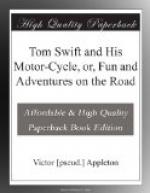From then on Barton Swift lived in a world of inventions. People used to say he would never amount to anything, that inventors never did, but Mr. Swift proved them all wrong by amassing a considerable fortune out of his many patents. He grew up, married and had one son, Tom. Mrs. Barton died when Tom was three years old, and since then he had lived with his father and a succession of nurses and housekeepers. The last woman to have charge of the household was a Mrs. Baggert, a motherly widow, and she succeeded so well, and Tom and his father formed such an attachment for her, that she was regarded as a fixture, and had now been in charge ten years.
Mr. Swift and his son lived in a handsome house on the outskirts of the village of Shopton, in New York State. The village was near a large body of water, which I shall call Lake Carlopa, and there Tom and his father used to spend many pleasant days boating, for Tom and the inventor were better chums than many boys are, and they were often seen together in a craft rowing about, or fishing. Of course Tom had some boy friends, but he went with his father more often than he did with them.
Though many of Mr. Swift’s inventions paid him well, he was constantly seeking to perfect others. To this end he had built near his home several machine shops, with engines, lathes and apparatus for various kinds of work. Tom, too, had the inventive fever in his veins, and had planned some useful implements and small machines.
Along the pleasant country roads on a fine day in April rode Tom Swift on his way to Mansburg to register the letter. As he descended a little hill he saw, some distance away, but coming toward him, a great cloud of dust.
“Somebody must be driving a herd of cattle along the road,” thought Tom. “I hope they don’t get in my way, or, rather, I hope I don’t get in theirs. Guess I’d better keep to one side, yet there isn’t any too much room.”
The dust-cloud came nearer. It was so dense that whoever or whatever was making it could not he distinguished.
“Must be a lot of cattle in that bunch,” mused the young inventor, “but I shouldn’t think they’d trot them so on a warm day like this. Maybe they’re stampeded. If they are I’ve got to look out.” This idea caused him some alarm.
He tried to peer through the dust-cloud, but could not. Nearer and nearer it came. Tom kept on, taking care to get as far to the side of the road as he could. Then from the midst of the enveloping mass came the sound of a steady “chug-chug.”
“It’s a motor-cycle!” exclaimed Tom. “He must have his muffler wide open, and that’s kicking up as much dust as the wheels do. Whew! But whoever’s on it will look like a clay image at the end of the line!”
Now that he knew it was a fellow-cyclist who was raising such a disturbance, Tom turned more toward the middle of the road. As yet he had not had a sight of the rider, but the explosions of the motor were louder. Suddenly, when the first advancing particles of dust reached him, almost making him sneeze, Tom caught sight of the rider. He was a man of middle age, and he was clinging to the handle-bars of the machine. The motor was going at full speed.




